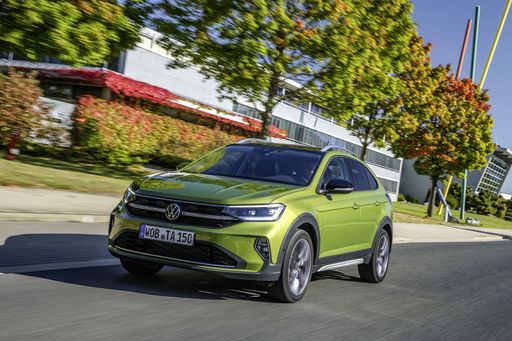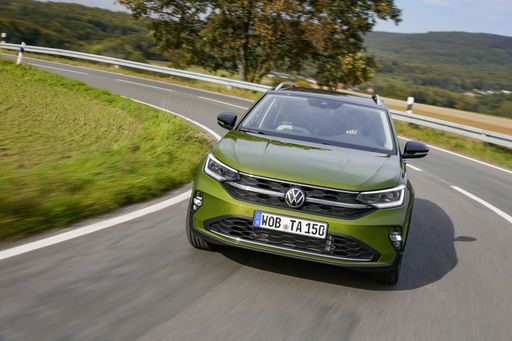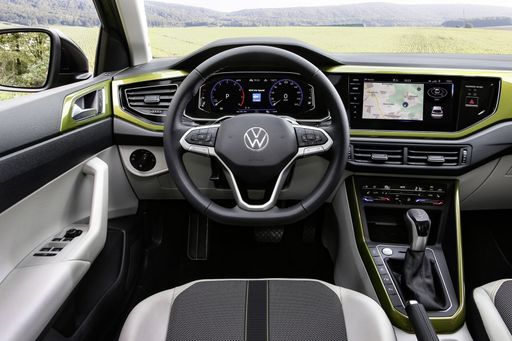In the competitive automotive landscape, the battle between the Toyota Yaris Cross and VW Taigo is one that stands out, each offering unique features and capabilities. As the demand for compact SUVs rises, both models promise a blend of practicality and style. This comparison will delve into the technical aspects and innovations of these two popular choices.
Toyota Yaris Cross vs VW Taigo - Differences and prices compared
Compare performance (130 HP vs 150 HP), boot space and price (23700 £ vs 19900 £ ) at a glance. Find out which car is the better choice for you – Toyota Yaris Cross or VW Taigo?
Design and Dimensions
Size matters when it comes to urban driving and parking, and both the Yaris Cross and Taigo present dimensions that are ideally suited for city life. The Toyota Yaris Cross measures 4180 mm in length, 1765 mm in width, and stands at 1595 mm tall. In contrast, the VW Taigo stretches slightly longer at 4266 mm but is marginally narrower at 1757 mm and shorter at 1518 mm in height.
Both vehicles offer five doors and accommodate five passengers comfortably. While the Yaris Cross sports a rugged SUV profile, the Taigo leans into a more coupe-like silhouette, appealing to those who prefer a sportier aesthetic.
Powertrain Options
The Yaris Cross prides itself on being a full hybrid vehicle. With power outputs ranging from 116 to 130 HP, its 1.5-liter engine with 3 cylinders ensures an environmentally friendly driving experience. The model boasts excellent fuel efficiency with consumption figures between 4.5 to 4.8 L/100 km and a CO2 output of approximately 101-108 g/km.
On the other hand, the VW Taigo features a selection of petrol engines with power options ranging from 95 HP to a robust 150 HP. This model offers both manual and automatic transmissions, ensuring versatility for diverse driving preferences. With its more powerful variants, the Taigo achieves acceleration from 0 to 100 km/h in as little as 8.2 seconds, significantly quicker than the Yaris Cross, which ranges from 10.7 to 11.3 seconds.
Performance and Handling
Both vehicles use a front-wheel-drive configuration, enhancing their efficiency and handling capabilities. The Yaris Cross features a CVT (Continuous Variable Transmission), providing seamless acceleration. However, the Taigo’s array of transmission options, including the 7-speed dual-clutch automatic, offers drivers a sportier engagement with the road.
When it comes to top speeds, the Yaris Cross reaches 170 km/h, while the Taigo showcases a range from 184 km/h to an impressive 212 km/h, depending on the engine variant. These performance specifications make the Taigo a more thrilling choice for those who prioritize speed alongside urban usability.
Interior Space and Comfort
Inside, the Yaris Cross offers practicality with a trunk capacity ranging from 320 to 397 liters, depending on the trim. This space is adequatively designed for everyday use. In contrast, the Taigo takes the lead with a larger trunk space of 440 liters, making it more accommodating for trips and errands.
While both models comfortably seat five, the Yaris Cross focuses on a modern, minimalist interior design, integrating high-tech features like a touchscreen infotainment system with smartphone connectivity. The Taigo, known for its premium materials and soundproofing, provides a more luxurious feel without compromising on tech innovation.
Fuel Economy and Environmental Impact
The Yaris Cross excels in fuel efficiency, making it an attractive option for eco-conscious drivers. Its hybrid technology not only saves on fuel costs, averaging between 4.5 to 4.8 L/100 km, but also positions it as a greener alternative with lower CO2 emissions. Comparatively, the Taigo's petrol engines consume between 5.4 to 5.8 L/100 km, offering reasonable efficiency for conventional petrol vehicles but falling short of the Yaris Cross's hybrid capabilities.
Pricing and Value
Pricing is always a paramount consideration for buyers. Generally, the Yaris Cross may come at a slightly higher premium due to its hybrid technology, which aligns well with its efficiency and lower running costs. However, the Taigo, with its competitive pricing and advanced features, remains an alluring choice, particularly for customers who prioritize driving pleasure over fuel economy.
Conclusion
In conclusion, choosing between the Toyota Yaris Cross and VW Taigo ultimately depends on the buyer's priorities. The Yaris Cross succeeds with its hybrid efficiency, practicality, and spacious interior, making it an excellent urban SUV choice. In contrast, the Taigo impresses with its robust engine options, stylish design, and slightly better trunk space. Each vehicle brings something unique to the table, making either a worthy contender in the ever-evolving compact SUV market.
Here’s where it gets real: The technical differences in detail
Costs and Efficiency:
Price and efficiency are key factors when choosing a car – and this is often where the real differences emerge.
VW Taigo has a to a small extent advantage in terms of price – it starts at 19900 £ , while the Toyota Yaris Cross costs 23700 £ . That’s a price difference of around 3771 £.
Fuel consumption also shows a difference: Toyota Yaris Cross manages with 4.50 L and is therefore slightly more efficient than the VW Taigo with 5.30 L. The difference is about 0.80 L per 100 km.
Engine and Performance:
Power, torque and acceleration are the classic benchmarks for car enthusiasts – and here, some clear differences start to show.
When it comes to engine power, the VW Taigo has a a bit edge – offering 150 HP compared to 130 HP. That’s roughly 20 HP more horsepower.
In acceleration from 0 to 100 km/h, the VW Taigo is distinct quicker – completing the sprint in 8.20 s, while the Toyota Yaris Cross takes 10.70 s. That’s about 2.50 s faster.
Space and Everyday Use:
Cabin size, boot volume and payload all play a role in everyday practicality. Here, comfort and flexibility make the difference.
Both vehicles offer seating for 5 people.
In curb weight, Toyota Yaris Cross is slight lighter – 1180 kg compared to 1229 kg. The difference is around 49 kg.
In terms of boot space, the VW Taigo offers hardly perceptible more room – 440 L compared to 397 L. That’s a difference of about 43 L.
When it comes to payload, Toyota Yaris Cross somewhat takes the win – 510 kg compared to 457 kg. That’s a difference of about 53 kg.
Who wins the race in the data check?
The VW Taigo holds a solid overall lead in the objective data comparison.
This result only shows which model scores more points on paper – not which of the two cars feels right for you.
Costs and Consumption
View detailed analysis
Engine and Performance
View detailed analysis
Dimensions and Body
View detailed analysis

VW Taigo
Toyota Yaris Cross
The Toyota Yaris Cross takes the jaunty personality of the Yaris and gives it a taller stance and a bit more practicality, so you get city-friendly agility with added SUV presence. It’s easy to live with, economical on the daily grind, and smartly packaged — a sensible pick for buyers who want fuss-free transport with a touch of character.
details






VW Taigo
The VW Taigo brings coupe-like flair to the compact crossover scene with sharp styling and an interior that punches above its price, feeling smarter than you’d expect. It’s an easygoing daily companion that balances comfort and practicality with a playful wink, perfect for city drivers who want something livelier than a regular hatchback.
details




Costs and Consumption |
|
|---|---|
|
Price
23700 - 34300 £
|
Price
19900 - 31800 £
|
|
Consumption L/100km
4.5 - 4.8 L
|
Consumption L/100km
5.3 - 5.8 L
|
|
Consumption kWh/100km
-
|
Consumption kWh/100km
-
|
|
Electric Range
-
|
Electric Range
-
|
|
Battery Capacity
-
|
Battery Capacity
-
|
|
co2
101 - 108 g/km
|
co2
120 - 132 g/km
|
|
Fuel tank capacity
-
|
Fuel tank capacity
-
|
Dimensions and Body |
|
|---|---|
|
Body Type
SUV
|
Body Type
SUV
|
|
Seats
5
|
Seats
5
|
|
Doors
-
|
Doors
-
|
|
Curb weight
1180 - 1290 kg
|
Curb weight
1229 - 1302 kg
|
|
Trunk capacity
320 - 397 L
|
Trunk capacity
440 L
|
|
Length
-
|
Length
-
|
|
Width
1765 mm
|
Width
1757 mm
|
|
Height
-
|
Height
-
|
|
Max trunk capacity
-
|
Max trunk capacity
-
|
|
Payload
485 - 510 kg
|
Payload
448 - 457 kg
|
Engine and Performance |
|
|---|---|
|
Engine Type
Full Hybrid
|
Engine Type
Petrol
|
|
Transmission
Automatic
|
Transmission
Manuel, Automatic
|
|
Transmission Detail
CVT
|
Transmission Detail
Manual Gearbox, Dual-Clutch Automatic
|
|
Drive Type
Front-Wheel Drive, All-Wheel Drive
|
Drive Type
Front-Wheel Drive
|
|
Power HP
116 - 130 HP
|
Power HP
95 - 150 HP
|
|
Acceleration 0-100km/h
10.7 - 11.3 s
|
Acceleration 0-100km/h
8.2 - 11.1 s
|
|
Max Speed
-
|
Max Speed
-
|
|
Torque
-
|
Torque
175 - 250 Nm
|
|
Number of Cylinders
3
|
Number of Cylinders
3 - 4
|
|
Power kW
85 - 96 kW
|
Power kW
70 - 110 kW
|
|
Engine capacity
1490 cm3
|
Engine capacity
999 - 1498 cm3
|
General |
|
|---|---|
|
Model Year
2026
|
Model Year
2024 - 2025
|
|
CO2 Efficiency Class
C
|
CO2 Efficiency Class
D
|
|
Brand
Toyota
|
Brand
VW
|
Is the Toyota Yaris Cross offered with different drivetrains?
Available configurations include Front-Wheel Drive or All-Wheel Drive.
